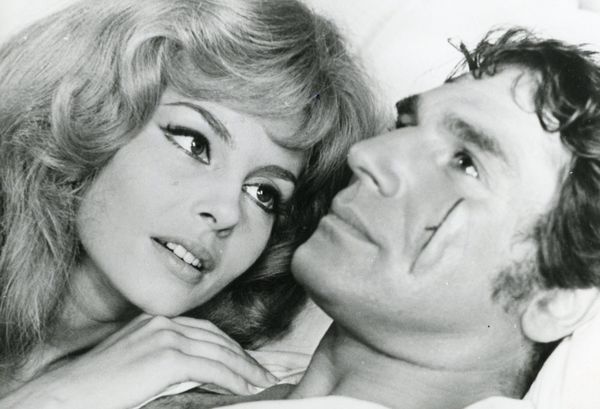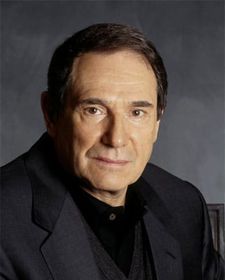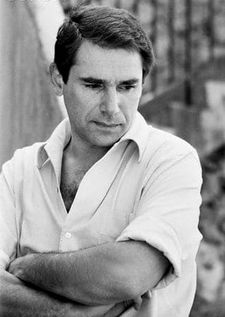 |
| One of Robert Hossein’s most popular roles as the dashing Count of Peyrac opposite Michèle Mercier in Angelica – Marquis of Angels (Angélique Marquise des Anges) (Photo Unifrance) Photo: Unifrance |
 |
| Robert Hossein Photo: Unifrance |
He progressed to make over the helm of the Theâtre Populaire de Reims and from 1975 onwards he was responsible for many super-productions staged at such vast arenas as the Palais des Sports, Palais des Congrès and the Stade de France in Paris, attracting audiences of between 300,000 and 700,000. Among his epic offerings was the gladiator tale Ben-Hur. He had stints at the Comédie Française and the Theâtre de Paris before becoming artistic director of the Théâtre Marigny from 2000 to 2008.
He began his appearances as a cinema actor in 1948 in Le Diable Boîteux by Sacha Guitry and in Memories Are Not for Sale (Les Souvenirs Ne Sont Pas à Vendre) by Robert Hennion. Hossein started directing films in 1956 with Bastards Go To Hell (Les Salauds Vont En Enfer) from a story by Frédéric Dard whose novels and plays went on to furnish Hossein with much of his later film material.
Although Hossein had some modest international successes with films like Toi, le venin and Le vampire de Dusseldorf, he was singled out for scorching criticism by the critics and followers of the New Wave for the unashamedly melodramatic frameworks of his films. The fact that he was essentially an auteur director with a consistent set of themes and an extraordinary mastery of original and unusual approaches to staging his stories, was never appreciated. He was not averse to trying his hand at widely different genres and was never defeated, making the strikingly different spaghetti western Une Corde, Un Colt and the low-budgeted but daringly subversive period drama I Killed Rasputin.
Alternating between theatre and film he adapted Victor Hugo’s Les Miserables for the cinema in 1982, winning a special prize at the Moscow Film Festival as well as a César nomination for the adaptation and dialogue (written with Alain Decaux). Despite the odd exception Hossein virtually ended his film directing career in 1970, to concentrate on theatre where his achievements were never questioned. He described his lavish stage productions as “theatre like you’ve never seen in the cinema.”
 |
| Robert Hossein, '...always inventing a strategy to survive' Photo: Unifrance |
Among his greatest film successes as an actor were the four-part costume drama Angelica – Marquis of Angels (Angélique Marquise des Anges) directed by Bernard Borderie from 1964 to 1968. He played the swashbuckling Count of Peyrac alongside Michèle Mercier. He was also top of the bill in the thriller Du Rififi Chez Les Homes by Julies Dassin as well as Love on a Pillow (Le repos du guerrier, 1962) opposite Brigitte Bardot and Barberella with Jane Fonda (both directed by Roger Vadim). For Sergio Gobbi’s The Case (L’Affaire) in 1994 he won a best actor award at the Cognac Film Festival of thrillers.
"My parents were beautiful but without a family circle. I was on my own. I was the puss in boots always inventing a stratagem to survive", he noted in his book Light and Darkness published in 2002. "I pulled out and I went to the movies a lot. On my return, I played all the roles, I embellished, I mixed all the worlds that made me dream … and I have not changed".
Co-star Bardot recalled his “slavic charm” from his mother’s side. “His talents as an actor and as a director pervaded both cinema and theatre. I hope my wonderful warrior rests in peace.” Gilles Jacob, a former president of the Cannes Film Festival, described him as “a prince of theatre for the masses.”





















